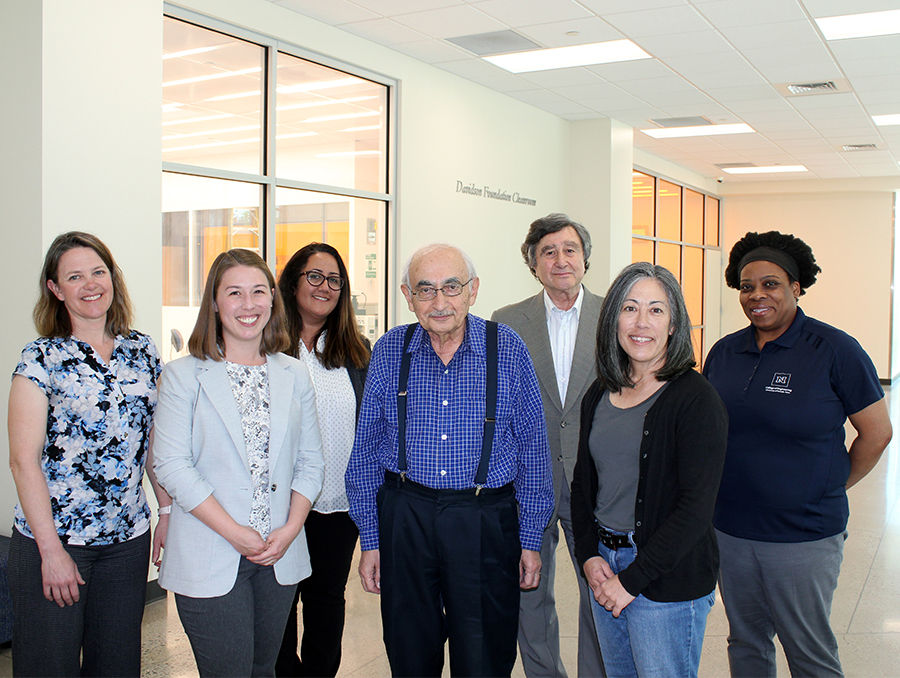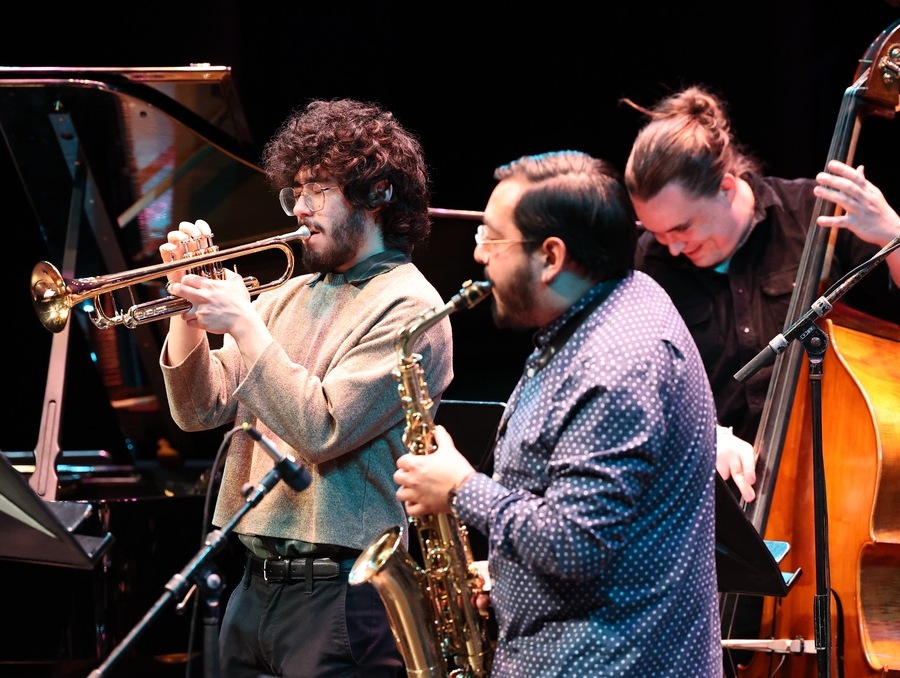University of Nevada, Reno President Marc Johnson stressed the institution's numerous accomplishments of the past year, as well as a sense of cautious optimism as the campus faces the future, during a town hall meeting on Wednesday, Feb. 1, in the ballroom of the Joe Crowley Student Union.
Johnson told a crowd of more than 140, plus more than 100 who were watching the town hall online, that the University had come through difficult times because of its "remarkable" ability to maintain momentum, whether it was in the form of record student enrollment and graduation, faculty productivity, or a donor and alumni base that had invested in the University at a higher level in 2011 than the year previous.
Johnson said people are talking about the University in ways that should make faculty, staff and students proud.
"All those (positive) remarks come because of what all of you do," Johnson said. "They come because our staff is friendly, because our faculty is productive, and because our students are so excited about what they are doing here."
Johnson later added, "The effort, creativity and zeal you've all shown during this time has been remarkable."
Johnson stressed that the next two legislative cycles for the state of Nevada will present more challenges. State support, most experts agree, will be flat. Given this fact, Johnson said the University, if it is to continue to meet its mission, "must grow based on our own initiative."
Johnson said this could happen if the 2013 Nevada State Legislature endorses the Nevada System of Higher Education's position to allow its member campuses to retain registration fees and tuition fees, and apply the state's current funding formula for higher education only to the state's appropriation.
Such a scenario, Johnson said, would "provide base growth for us. (Keeping registration and tuition fees) would become a base growth and would be treated as long-term money, long-term money we could use to hire fulltime faculty and fulltime staff. An enrollment-responsive revenue structure would help us rebuild, and to grow."
Johnson said the University's budget for 2012 is balanced, but 2013's budget "will be a little short" due to the extension of the implementation of certain budget-reduction measures from the past year. Johnson said that the shortfall will be met with one-time funds. He said there will be no use of curricular review to meet the shortfall.
"We will take care with anticipated one-time funds (to fill the gap), so we're not looking at any more adjustments," Johnson said, drawing a round of applause from the audience.
For Fiscal Year (FY) 2013, Johnson reported that the University has $4.2 million in funds through the 8 percent student fee increase that was approved by the Board of Regents. The funds will be used for 15 faculty tenure-track positions, 15 to 18 graduate teaching assistantships to bolster graduate education, library materials, the Career Development Center, and other needs. In addition, for FY 2012, the University has $5.5 million in funds from increases in in- and out-of-state enrollments.
"As our student body continued to grow, we had a tremendous jump in out-of-state students," Johnson said. He added that the Board of Regents voted its approval for the University to go to the legislative Interim Finance Committee, which granted the University permission to spend the funds.
"This is one-time money," Johnson said. "We have decided to spend it on needs such as classroom renovations, debt reduction and temporary instruction."
Johnson said among the many achievements the University has marked in recent months - Tier I status for the second straight year, record numbers of National Merit and Presidential Scholars on campus - one of the most exciting has been the engagement faculty and staff have fostered with students, and vice-versa.
He said that "student-involved, experiential" learning has become one the University's hallmarks.
"Through your efforts, this has become a remarkable campus," he said.
He cited the national and regional championships won over the past years by the University's concrete canoe team, an "original pronunciation" production of Hamlet that was staged through the theater program featuring University students, Shakespearean scholars and the lead actor from England's famed Globe theater, as well as the revitalization of the marching band.
Johnson recalled how the University took 30 members of the marching band to the Wolf Pack football team's December appearance in the Hawaii Bowl. Needing a room to practice, marching band members eventually could only find space on Waikiki Beach, "where only the ukuleles were playing," Johnson said with a grin.
Needless to say, Johnson said, the marching band drew quite a bit of attention as they practiced the school fight song on the beach.
More important than the school spirit that was engendered - not to mention the positive impact of an immediate marketing moment for the University before tourists from all over - Johnson said he was struck by the fact that it was something those students would be talking about for years to come.
Their University experience, he said, had been broadened in a fun and memorable way.
"These students will remember that experience forever," Johnson said.
Turning to upcoming plans, Johnson unveiled several steps the University will be taking in the coming months, as the search for a new president is finalized this spring.
He said effort is already underway to develop relationships with the 63 members of the Nevada State Legislature, as well as the office of Nevada Gov. Brian Sandoval.
"We have developed a very active plan to visit with all 63 members of the legislature between last June and this coming December," Johnson said.
Johnson said the University is also actively seeking partnerships and involvement with the local and state business community.
"The University has a lot to offer to the economic development discussion," he said, citing the work of a campus business task force headed by College of Business Dean Greg Mosier to "identify all (economic) activities going on to infuse our talents and expertise into these discussions."
He said the University's research portfolio, which has risen by 18 percent to $81 million in the past year, provides another opportunity for economic diversification through tech transfer, preparation of students and "overall research which is IP-protected (Intellectual Property-protected) and can be commercialized. This can all be very important to this state."
Johnson added that the University is making preparations for a capital campaign, a process which he said needs to begin now.
"If we waited for the next president to get here, we would lose a year of preparation," he said.
Among the University's actions for 2012, Johnson said the University is teaming with Washoe County School District and Truckee Meadows Community College to create a "clear pathway" for more students to not only attend college in Nevada, but to ensure "a more college-ready student" where less remedial work will be needed once students arrive on college campuses in Nevada. He cited College of Education Dean Christine Cheney's efforts in helping marshal the University's resources in the effort.
Johnson said the University must continue to seek partnerships with major industries in Nevada, such as the relationship that has been developed over the past year with the Nevada's booming mining companies. By partnering with three of the world's leading mining companies, Johnson noted that College of Science Dean Jeff Thompson has been able to add two new degree programs and three endowed professorships "without spending a nickel of state money."
Regarding enhancements for 2012, Johnson said the University will be encouraging the Nevada System of Higher Education, in working with the legislature, to support restoration of pay, the elimination of furloughs and improved benefits for higher education employees.
"It's very important that we restore the level of compensation and benefits for all of our employees, who have worked so hard to maintain our momentum," Johnson said.
In addition, the University, in an effort to better meet the state's needs for health and outreach, will seek state support in expanding faculty positions for medicine and nursing to handle larger class sizes being taught in the new Health Sciences building, and to rebuild funding for University of Nevada Cooperative Extension.
Capital projects, both in the near- and long-term, will focus on consolidating student success service functions such as writing, math and tutoring, disabilities service and career development into the empty Getchell Library building.
A possible Getchell Student Achievement Center, Johnson said, would "become a very active third pillar in ensuring our students succeed on our campus. We already have two buildings (the Joe Crowley Student Union and the Mathewson-IGT Knowledge Center) to keep students engaged, and this would be the third building to help our students graduate by bringing together all the support services they need."
Designs are also being prepared for a Church Fine Arts renovation, an indoor practice facility, and a Chemistry and Engineering building.
During the Q&A portion of the town hall, Johnson was asked about silos, and if it remained a goal of his to remove such barriers on campus.
Citing examples where teams from across campus had worked together in renewable energy and K-12 outreach, Johnson noted, "We don't solve problems anymore with single disciplines. You solve them with several disciplines. It's very important that we maintain departments to support deep disciplinary learning, and it's also very important to reach across departments to share knowledge and solve problems."
On a somewhat lighter note, Johnson and entire room smiled and chuckled when an online viewer asked if the proposal to restore pay and eliminate furloughs would be retroactive. Johnson, more seriously, said that, "We want to get people back to where they were." He added that the University has continued to keep merit scores in the event that if merit pay is ever restored, "those scores will count."











